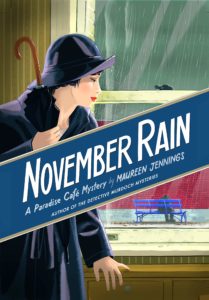 This is the second entry in Maureen Jennings’ Paradise Café series, set in almost wartime Toronto (1936). Detective Murdoch’s son, Jack, is now the “Detective Murdoch” in this series, which centers on young Charlotte Frayne, who has joined up with an older private investigator, Mr. Gilmore. Mr. Gilmore is out of town as the story opens.
This is the second entry in Maureen Jennings’ Paradise Café series, set in almost wartime Toronto (1936). Detective Murdoch’s son, Jack, is now the “Detective Murdoch” in this series, which centers on young Charlotte Frayne, who has joined up with an older private investigator, Mr. Gilmore. Mr. Gilmore is out of town as the story opens.
Charlotte arrives to open the office and discovers two women waiting for her, both of them in heavy mourning. As Jennings lays her story parameters out in this first chapter, I think her rare capacity for both breaking a reader’s heart and reaching it have never been more strongly on display than they are here. The women relate the story of the suicide of Gerald Jessup, the son of one and the wife of the other.
When WWI started he was a sunny, beautiful young man but he came home disfigured and traumatized, taking to excessive drink to help get him through the day. He’s had bouts of sobriety which makes his relapses all the harder to take. He had been discovered dead in his bathtub but Mrs. Jessup Sr. is sure his death was not actually a suicide but a homicide, and she takes Charlotte on to look into his death more carefully than she feels the police will.
Charlotte reluctantly agrees, and then she’s asked to take on another case: working undercover in a clothing sweatshop to see if there are any Communist sympathizers trying to organize a union. Before she can even start work, though, the manager is found murdered, and Charlotte is drafted (thanks to her clerical skills) as a defacto assistant to Detectives Murdoch and Arkady as they investigate the man’s death.
Jennings is brilliant at what I call the matrix – the surround of character and setting that add richness and depth to any story. Part of the “matrix” in this series is the Paradise Café, a place where working men and women (mostly the working poor) line up for a good, home cooked meal every day at lunch and dinner. The idea was formed during the last war when the owners (one of them sweet on Charlotte) were prisoners of war and the thought of the food they loved kept them going. There’s always one of these specific memories tucked into the books that are like a little amuse bouche for the reader, of the bittersweet variety.
Jennings is also deeply interested in war veterans and what wars do to these men, and to those who love them. This is a strong theme here as Charlotte follows the tendrils of Gerald’s life as well as those of another vet Gerald encounters at the Paradise Café.
Jennings is nothing if not a careful and intelligent writer, so I always know connections made by the characters have a meaning that will advance the plot. She’s also that wonderful and increasingly rare thing, concise. She doesn’t skimp her words but she doesn’t waste them either. Her sensitive and thoughtful explication and observation of character in her books adds to their depth and makes them linger in the memory long after you’ve finished reading.